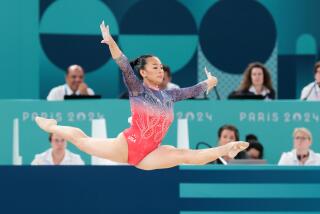GRETE WAITZ : She Puts Her Heart Into Seoul
- Share via
What Grete Waitz has learned from losing is plenty.
She has learned not to listen to those who would have her hang her head for finishing second to Joan Benoit Samuelson in the first Olympic women’s marathon in 1984. Waitz has always known that the effort was at least the equal of the outcome.
What she has learned from winning is not bad, either.
Waitz has learned that she and her husband, Jack, enjoy the life style that comes with the money she earns from running. They enjoy some travel and some fame, although Waitz has always said she does not confuse the trappings of fame with the reality of life.
But what Grete Waitz--world champion, Olympic silver medalist and heroine in her country of Norway--has learned in the last year of injury and disappointment has been the best of all.
Before the World Championships in Rome last year, Waitz said that marathon would be her last major race. Then she went at her training as if it would be her last race, period.
She trained at altitude in St. Moritz in the Swiss Alps for four weeks. She pointed her season’s training and racing for that one race, a race she won four years before in Helsinki at track and field’s first World Championships. Waitz wanted to repeat as world champion.
Then a bone in her right foot snapped.
“I went to Rome thinking that the pain would go away in a couple of days,” Waitz said Thursday in Los Angeles--she was here to promote the Manufacturers Hanover Corporate Challenge race Sept. 27 in Griffith Park.
“The pain didn’t go away, and we took a bone scan,” she said. “A week before the race, we found that there was a stress fracture. It was so painful that I knew it was something more serious. Of course, I was very sad and disappointed. I had trained all year, I had left some races off my schedule, just for the World Championships. I had focused so much on the championships that it was like my whole 1987 season was nothing.
“I stayed in town to do commentary for Norwegian television. In a way, it was better for me to be there. It took my mind off the race to be working. As soon as they got going in the race, I knew I could have never run with my foot as it was.”
Waitz returned to Norway and brooded. She recalled another great disappointment, under similar circumstances. Before the European Championships in 1983, Waitz also trained at St. Moritz. She loved the picturesque setting and the long, inviting running paths.
“It was so beautiful there that you felt guilty if you didn’t run four times a day,” she said.
But Waitz’s overzealous training resulted in a knee injury that kept her out of the European Championships that year. That lack of restraint--”Runners are so crazy sometimes,” she said--repeated itself before Rome.
Remember that Waitz, 34, has recently written a book about training methods and regimens. In it she stresses the importance of listening to your body, lest you overtrain. Stress fractures are the result of overtraining.
It is often said that athletes come to some common conclusions during prolonged periods of injury. They say they learn about themselves and their sport. They say they discover what is really important.
That is what Waitz says she learned after 10 months out of competitive running.
“We realize that we can’t go out and do what we did 10 years ago,” she said. “We all age.
“There were many bad times. I was so disgusted. There were times when I was limping around in so much pain, that I thought I would never run again.
“Jack and I talked about a lot of things during this time. What I learned was that I like what I am doing. I like to train and to compete and to travel. I learned that I am not yet ready to give that up.
“Because of the injury, I was not able to run. But I found that if I should retire from competitive running I shall do it because it is something I want to do. I don’t want to do it because I have to. When running is not important to my life, I will stop. I found out that I was not ready to quit.”
Waitz has won two races since returning to competition in April. She is taking her new attitude to Seoul, where she will run the marathon in what she said will be her last Olympics.
Yet Waitz’s renewed fervor is tempered by her longstanding, very Norwegian, approach to winning: It is as good to do well and try, as it is to win.
“I would love to win the Olympic marathon, of course,” she said. “But my life will not end if I do not. I will do my best. That is what is important. Winning is not everything.”
More to Read
Go beyond the scoreboard
Get the latest on L.A.'s teams in the daily Sports Report newsletter.
You may occasionally receive promotional content from the Los Angeles Times.







